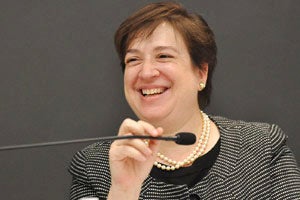Just two days after making her debut before the Supreme Court, Solicitor General and former Dean Elena Kagan ’86 returned to the Harvard Law School campus to give students an insider’s account of her new role.
At 5 p.m. on a Friday afternoon, a standing-room only crowd of eager students spilled into the hallway in Pound Hall to hear Kagan, along with Harvard Law School Professors Charles Fried, who served as solicitor general from 1985-1989; John Manning ’85, who served as assistant solicitor general from 1991-1994; and Dean Martha Minow, who moderated the discussion.
The panel focused on the Solicitor General’s unique role as a “backstop for the rule of law,” as Manning described the office’s job. In that role, the office has immense authority, and as a result must be a dispassionate defender of long-term interests of the United States, the panelists agreed.
“A [high] level of professionalism, level of integrity, and the lack of politicization has been a historic hallmark of the office,” Kagan noted.
Said Fried, who headed the office for four years: “It is the model of what lawyers working together should be. It is marvelous.”
“I have never worked with a group of people so closely and so fruitfully with not any kind of internal rivalry,” Fried added. “Everybody there – these 22 lawyers – were rooting for everybody else, and that’s because of the huge amount of cases – everybody had plenty to do. Nobody, in order to [sort of] make it, ever had to bump anybody else.”
As the government’s top litigator, the Solicitor General supervises all aspects of government litigation and appeals, and serves as a filter, making recommendations to the Supreme Court about which about which petitions for certiorari should be granted.
Kagan said the Court agrees with her office’s advice about which cases should be heard a vast majority of the time. “The Solicitor General employs a very fine filter and really tries to see the case through the eyes of the Court,” she said.
Along with the 22 lawyers in the SG’s office, Kagan said, she relies upon a “literal army of lawyers” across the Federal Government, who perform legal analysis and write memos recommending courses of action. Based on all of that work, only those matters that present an important legal issue that has been sufficiently “ventilated” in the lower courts are recommended for certiorari.
Manning, who served during the transfer of power between President George H.W. Bush and President Bill Clinton, described the lack of political bias in the office. Of the 22 attorneys on staff, only two are political appointees, he said. Because most everyone in the office is a career attorney, there is very little turnover. “There is an ethos of professionalism and neutrality and dispassionate lawyering that is exceptional and, I think, unique in the government and in the world of policy-making,” Manning said.
But, the Solicitor General’s office is an advocate with a client and a specific job to do in defending statutes before the Court, Manning added. Thus, the Solicitor General is not completely immune to politics, to the extent that the legal positions on high-level issues may change when there is a change in the administration. Because the Solicitor General ultimately works for the President, however, Manning said those policy changes are appropriate.
Manning also stressed the Solicitor General’s role as a “repeat player” before the Court. Kagan agreed, saying that each Solicitor General typically argues at least one case per sitting of the Supreme Court, making her the most frequent litigant before the Court.
“The SG has an absolute obligation to be honest to the Court” said Kagan.. “I can’t do anything…that will make me lose my credibility.”
Fried praised Kagan’s debut argument. “Elena’s argument was exactly what an SG’s argument should be,” he said.
Kagan added that she was ultimately just fighting to win her case for her client – in this case, Congress. “I was doing my damndest up there,” she said.
She summed up her new job by describing the delicate balancing act of being honest with the Court while still trying to win. “The SG has many masters. The trick of the job is figuring out how to accommodate the interests of the different players.”
Related coverage:
